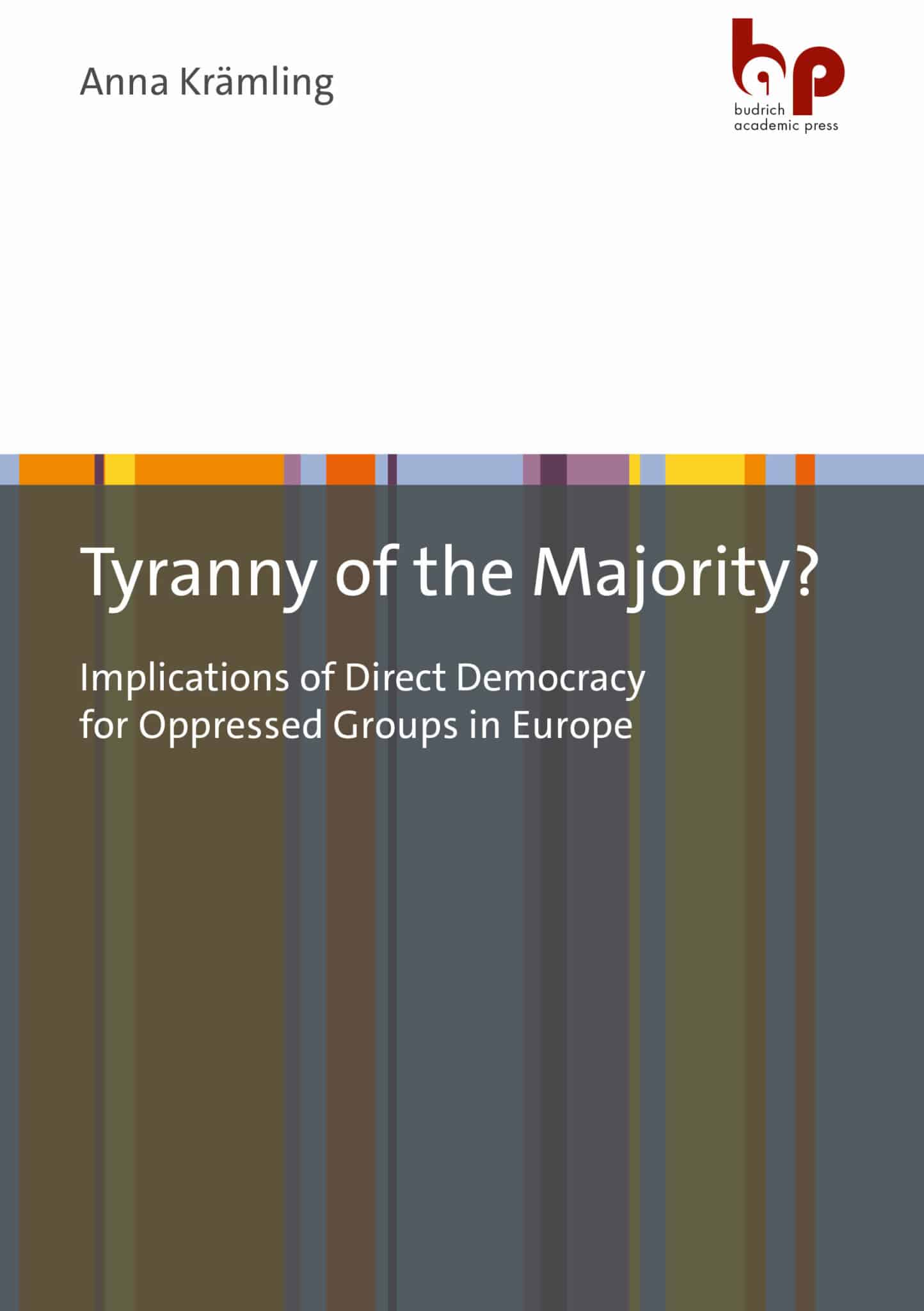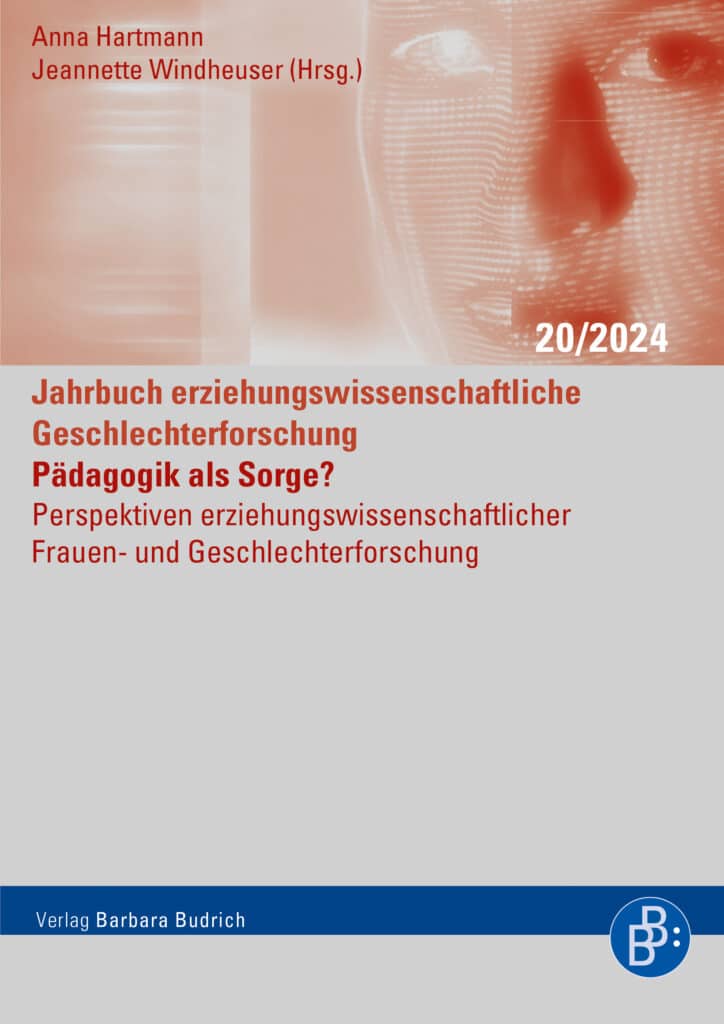Tyranny of the Majority?
Implications of Direct Democracy for Oppressed Groups in Europe
Erscheinungsdatum : 29.04.2024
26,99 € incl. VAT - 29,90 € incl. VAT
Beschreibung
Does direct democracy result in a Tyranny of the Majority for Oppressed Groups? This first analysis of over 500 referenda shows that on the contrary, Oppressed Groups were often able to benefit from direct democracy. However, the interests of LGBTQ+ groups, groups of low socioeconomic status, and foreign nationals are under pressure. To protect them, the book develops ways to design direct democratic votes that support Oppressed Groups.
Increased political influence of citizens through direct democratic votes – that does sound promising in times of growing political dissatisfaction and support for extremist parties. Yet, what does direct democracy with its majoritarian decision-making imply for Oppressed Groups? Previous research offered a mixed picture. Therefore, this book for the first time analyses all national-level direct democratic votes in Europe over 25 years. To arrive at an encompassing and differentiated overview, the author uses the concept of Oppressed Groups by Iris M. Young instead of the term minorities, which is often applied but only vaguely specified in research on direct democracy. The results show that Oppressed Groups were often able to actually benefit from direct democracy. Bills supporting their interests more often came to a vote than those disadvantaging them, and supporting bills also were more likely to be adopted at the ballot than their disadvantaging counterparts. However, this does not hold for a majority of bills affecting members of the LGBTQ+ community, groups of low socioeconomic status, and people without the citizenship of the country they live in. Based on further empirical analyses, the book as a result develops suggestions about how to design direct democratic votes to empower Oppressed Groups. Quite surprisingly, binding vote results and the absence of voting thresholds promote the success of bills supporting Oppressed Groups while at the same time lower the likelihood of success for damaging bills. The book also stresses the role of resources and attitudes in these votes and the necessity to support groups at a disadvantage in these regards. In doing so, the book addresses a long-lasting research gap and contributes to the academic as well as to the political debate on direct democracy.
Table of contents + reading sample
The author:
Anna Krämling earned her PhD at Goethe University Frankfurt and is now a public servant at the Hessian Ministry of Economic Affairs, Energy, Transportation and Rural Areas.
The subject:
Political science
Zusätzliche Informationen
| Publisher | |
|---|---|
| ISBN | 978-3-96665-084-7 |
| eISBN | 978-3-96665-913-0 |
| Format | 14,8 x 21 cm |
| Scope | 207 |
| Year of publication | 2024 |
| Date of publication | 29.04.2024 |
| Edition | 1. |
| Language | English |
Autor*innen
SchlagwörterApril 2024, democratic innovations, democratic votes, LGBT*Q, minorities, quantitative analyses, Referendum, research on democracy
Beschreibung
Beschreibung
Does direct democracy result in a Tyranny of the Majority for Oppressed Groups? This first analysis of over 500 referenda shows that on the contrary, Oppressed Groups were often able to benefit from direct democracy. However, the interests of LGBTQ+ groups, groups of low socioeconomic status, and foreign nationals are under pressure. To protect them, the book develops ways to design direct democratic votes that support Oppressed Groups.
Increased political influence of citizens through direct democratic votes – that does sound promising in times of growing political dissatisfaction and support for extremist parties. Yet, what does direct democracy with its majoritarian decision-making imply for Oppressed Groups? Previous research offered a mixed picture. Therefore, this book for the first time analyses all national-level direct democratic votes in Europe over 25 years. To arrive at an encompassing and differentiated overview, the author uses the concept of Oppressed Groups by Iris M. Young instead of the term minorities, which is often applied but only vaguely specified in research on direct democracy. The results show that Oppressed Groups were often able to actually benefit from direct democracy. Bills supporting their interests more often came to a vote than those disadvantaging them, and supporting bills also were more likely to be adopted at the ballot than their disadvantaging counterparts. However, this does not hold for a majority of bills affecting members of the LGBTQ+ community, groups of low socioeconomic status, and people without the citizenship of the country they live in. Based on further empirical analyses, the book as a result develops suggestions about how to design direct democratic votes to empower Oppressed Groups. Quite surprisingly, binding vote results and the absence of voting thresholds promote the success of bills supporting Oppressed Groups while at the same time lower the likelihood of success for damaging bills. The book also stresses the role of resources and attitudes in these votes and the necessity to support groups at a disadvantage in these regards. In doing so, the book addresses a long-lasting research gap and contributes to the academic as well as to the political debate on direct democracy.
Table of contents + reading sample
The author:
Anna Krämling earned her PhD at Goethe University Frankfurt and is now a public servant at the Hessian Ministry of Economic Affairs, Energy, Transportation and Rural Areas.
The subject:
Political science
Bibliography
Zusätzliche Informationen
| Publisher | |
|---|---|
| ISBN | 978-3-96665-084-7 |
| eISBN | 978-3-96665-913-0 |
| Format | 14,8 x 21 cm |
| Scope | 207 |
| Year of publication | 2024 |
| Date of publication | 29.04.2024 |
| Edition | 1. |
| Language | English |
Bewertungen (0)
Bewertungen
Es gibt noch keine Bewertungen.
Authors
Autor*innen
Schlagwörter
SchlagwörterApril 2024, democratic innovations, democratic votes, LGBT*Q, minorities, quantitative analyses, Referendum, research on democracy
Pressestimmen
Abstracts
Verlag Barbara Budrich
- +49 (0)2171.79491-50
- info@budrich.de
-
Stauffenbergstr. 7
51379 Leverkusen
Germany











Bewertungen
Es gibt noch keine Bewertungen.